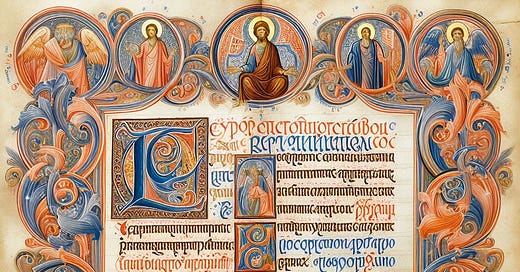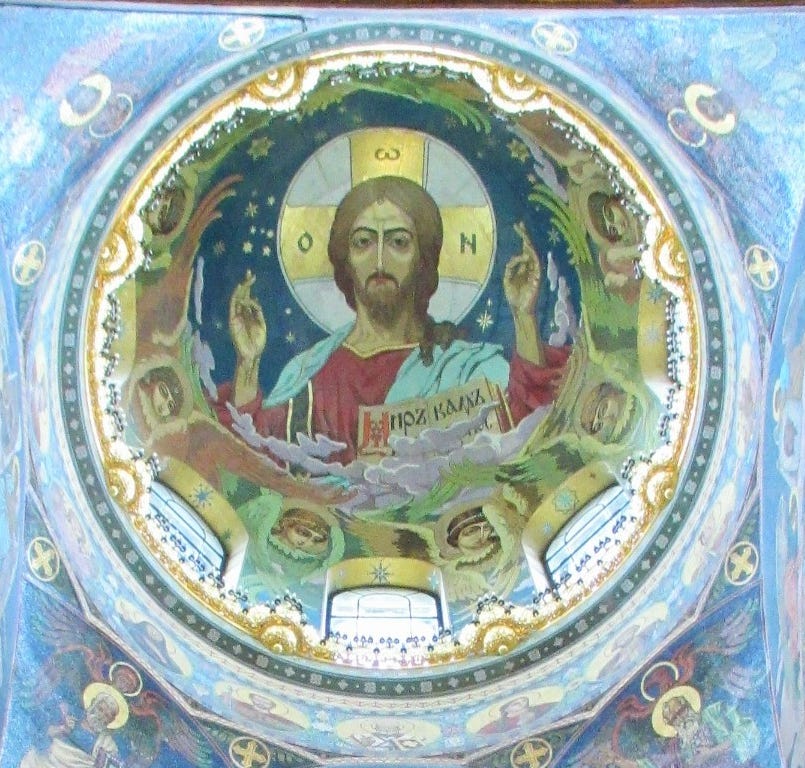Ruler of the Kings of the earth Revelation Revelation 1:5
I have set my King on Zion, my holy mountain. Psalm 2:6
Yahweh will send a staff of your authority from Zion: “Rule in the midst of your enemies.” Psalm 110:2
Back in the fall when the Israel-Gaza war began, all the rage of the end-times apocalyptic doomsayers rose up and attempted to rile Christians in the pew to some sort of righteous anger against the Muslim hordes of the east, as though the US war machine was the instrument of God to punish those nations that would rise up against Israel. Then came the internal realization that the “hordes” were among us and that our own government is ideologically split. The attempts to blame Russia and China for everything (not least by the end-times preachers) proves to be an indicting finger back to our government and those it is “allied” with it. There are no innocent governments in the current turmoil of the world.
And the Church should not pretend otherwise.
In Plain Sight is a subscriber supported publication. If you appreciate the content and insights of this Substack, please consider a paid subscription. Subscribers receive additional material at the end of most posts with more subscriber only material to come.
Christians will always be in a place of unease in this world, and any political party or politician who invokes God must be lightly held as to their motives (neither am I calling for the abolition of God from public acknowledgment or creeds such as the Pledge of Allegiance or God Bless America or US currency—banishing God from society and government leaves government as supreme “god” with life and death at its whim).
Leaders who do invoke God as a higher authority, truly or for personal gain, at least acknowledge that government is not God. God is God.
And those with actual faith in God must look to God as supreme authority with all of their being and oppose any authority that would demand otherwise.
Revelation is quite clear about governments and their leaders: they act in their own interests, ultimately guided by the Great Dragon—Satan. Governments allied with Satan (explicit or not) for ultimate power are a manifestation of the multi-headed Beast. These statements are not made to challenge the presence of leaders who claim to be Christians of which there are no doubt some—unfortunately the vortex of political power so many times sucks well-meaning leaders into compromise and even destruction.
This perspective of governments controlled by Satan seems to contradict Paul, Peter, and even Jesus at points, but only in appearance, not reality. We are to render unto Caesar, obey the government, live quiet lives, BUT NOT WHEN CALLED TO DENY JESUS OR THE WORSHIP OF THE TRINITARIAN GOD. Jesus is Lord, not Caesar or any government(s).
There will be many points during the next months in which I will develop this view further, but I introduce it in this post to set up the second part of “The Gospel of the Exalted Jesus.”
“The Rest of the Story”
In part 1, I gave reasons why Revelation should be considered the fifth Gospel or The Gospel of the Exalted Jesus. Revelation is a continuation of the Four Gospels, but instead of retelling the story of the earthly Jesus, it presupposes that story—the story of his incarnation, life, death, and resurrection (Revelation 1:4-5), then adds the “rest of the story.”
The rest of the story is of Jesus, the Firstborn from the dead, exalted to heaven at the throne of God as “ruler of the kings of the earth,” who will return to inaugurate a new heavens and new earth.
Today, I will develop the first image, Jesus as King (Revelation 1:5) and then (because this post would be too long otherwise) the Return of the King (Revelation 1:7) in a further post.
These two images are the predominant ones in the book of Revelation: Jesus reigns as heavenly King from this point in Revelation 1 all the way to Revelation 19. In Revelation 19 (previewed in Revelation 1:7), he will return to set up an eternal kingdom free of sin and death and Satanic dominion.
Ruler of the kings of the earth in the Psalms
The image of Jesus as King is a Messianic one. The Jewish people expected a Messiah from the line of David who would rule forever. But not just a king over the Jewish people. Instead a king of kings appointed by God before whom all other kings would bow.
The two preeminent locations for this Messianic theology are Psalms 2 and 110, which I translate in part here:
Psalm 2:1-9
Why do the nations rage and the peoples contemplate emptiness
The kings of the earth resist and the rulers conspire as one
against Yahweh and his Messiah (anointed):
“Let us break their bonds and throw their ropes from us.”
The One sitting in the skies laughs—the Lord mocks them.
Then He will say to them in his wrath, and in his anger He will terrify them:
[Yahwah speaking] “I have consecrated my king on Zion, my holy mountain.”
[Messiah speaking] “I will declare the decree of Yahweh. He said to me, ‘You are my son, I have begotten you this day.’”
[Yahweh speaking] “Ask of me and I will give the nations as your inheritance and the ends of the earth as your possession. You will rule them with a rod of iron and you will shatter them as a potter’s vessel.”
Psalm 110:1-2
An announcement of Yahweh to my Lord:
“Sit at my right hand until I put your enemies as a footstool for your feet”
Yahweh will send a staff of your authority from Zion: “Rule in the midst of your enemies.”
Though other Psalms allude to the kingship of the Messiah, these two join the Messiah with Yahweh in a way that looks to the relation of Jesus with the Father in the Gospels (especially John), and the exalted Jesus with the Almighty on the throne of heaven in Revelation. More importantly for our discussion, Jesus as “Ruler of the kings of the earth” is clearly connected to the Messianic images of these two Psalms (Revelation 2:27 directly quotes from Psalm 2:8–9; see also Revelation 11:15).
For John in Revelation 1:5, Jesus has fulfilled the full measure on God’s pronouncements in Psalms 2 and 110. He is now “the Ruler of the Kings of the earth.” There is much more to say about Psalm 2 and 110 in themselves and with respect to Revelation, but that will wait for another day.
For our purposes, the naming of Jesus as “the Ruler of the Kings of the earth” sets Revelation in alignment with the promotion and exaltation of the Messiah in those two Psalms, and serves to introduce Revelation as the Gospel of the Exalted Jesus.
King of Kings in Revelation
By naming Jesus “Ruler of the kings of the earth,” John inaugurates a prominent theme for the identity of Jesus in Revelation (others include “One like a Son of Man Shining like the sun,” “the Lamb Standing as Slain,” the Rider on the white horse with a two-edged sword proceeding from his mouth). Neither is the phrase is a one-off for John.
Consider the following:
Revelation 3:14: “Thus says the Amen, the Witness, the Faithful and True, the Ruler of the creation of God.”
Revelation 11:15: “And the seventh angel blew his trumpet and there came great voices in the heavens saying: The kingdom of the world has become the kingdom of our Lord and of his Messiah, and he will reign forever and ever.”
Revelation 15:3: “Great and astounding are your works, Lord God the Almighty; Your ways are righteous and true, O King of the nations.”
Revelation 17:14: “And they will make war with the Lamb, and the Lamb will defeat them because he is Lord of Lords and King of Kings.”
Revelation 19:15: “And on his robe and on his thigh a name is written: King of kings and Lord of lords.”
Spaced throughout Revelation is the repeated affirmation that Jesus is King.
His kingship is based in God’s exaltation of his Messiah to the heavenly throne.
For John, this truth—this confession— is the bedrock of his reality.
John’s theology of Jesus in Revelation as Ruler of the kings of the earth is more real, more true, more palpable, more substantive, more tangible, than the kings of the earth themselves or anything else in the created realm.
God and the Lamb on the throne in Revelation 4 and 5 are reality—everything else is a mirage.
As I wrote this post, the final verse of the hymn “Be Thou my Vision” came to mind:
High King of Heaven, my victory won,
May I reach Heaven’s joys, O bright Heaven’s Sun!
Heart of my own heart, whatever befall,
Still be my Vision, O Ruler of all.
Audio Version!
Please give me any feedback you may have!
For this post I have removed the paywall for the audio. Enjoy.





